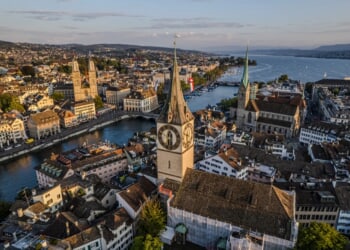Andrew Gilligan is a writer and former No10 adviser.
Why do governments make life so difficult for themselves?
Why do they invent such stupid policies?
Why do they reject easy ways of raising money and choose hard ways instead?
These thoughts – entirely non-partisan: the Tories were just as bad, or worse – were prompted by reports that Rachel Reeves will carry on with the now 14-year-old freeze on fuel duty in her autumn budget. (It’s supposed to rise by inflation: if it had done, it would now be raising almost £20 billion a year more than it does.)
Not just that, it’s reported that Reeves may even continue with the “temporary” five pence cut in the duty announced by Rishi Sunak in spring 2022.
For a chancellor in a fiscal crater, this is paralysingly dumb.
The freeze and the cut are estimated to have cost the government around £130 billion over the time they have been in place. But they are almost pointless, either for easing the cost of living or for buying votes.
Although they are really expensive to the state, these policies deliver only tiny savings – around £2 per week – for the average motorist. Too small, for most people, to make much difference to living standards, or even to be noticed. And that’s assuming that the duty cuts are passed on in full by retailers, which they often aren’t.
Nor can anyone claim that the freeze and cut are needed to compensate for soaring fuel prices. The opposite, in fact. In spring 2011, when the freeze began, the oil price was $110 (then about £81) a barrel. It is now about $67 (£50) a barrel.
The pump price of petrol is one-third lower now, in real terms, than it was then. Even in nominal terms, it’s about the same – £1.33 a litre in March 2011, £1.35 now.
There was a big spike a few years ago, because of the Ukraine war. That was the justification for Sunak’s 2022 cut. But that’s gone away now, too. In real terms, fuel hasn’t been so cheap for years. Most forecasters expect the oil price to fall further, and motoring to get still cheaper, meaning that the cut and the freeze are even less necessary.
Even the motoring lobby, by the way, thinks the cut, at least, is stupid and should be reversed. Simon Williams, head of policy at the RAC, said last year: “We’d normally be against any increase in duty. But we’ve long been saying drivers haven’t been benefitting from the current discount due to much higher-than-average retailer margins.”
Reeves is reported to believe that continuing the policies will help “working people.” But what it actually means is that she’ll have to raise other taxes which cost working people more, either directly or indirectly. Taxes which attack good things, such as employment or enterprise, in favour of promoting bad things, traffic congestion and pollution.
Even though the cost of petrol is low at the moment, I’m not saying that it doesn’t matter, or that it has no bearing on the economy. Of course it does. But how about having flexible fuel duty – which rises when oil prices fall, and falls when oil prices rise? That would still protect people at periods of genuinely increased motoring costs, while raising windfall revenue when costs fell.
So why do governments do this sort of thing?
The answer is the same as for the Islamophobia definition, or transgender self-ID, or HS2, or other stupid, damaging policies. It is that they listen too much to the loudest voices, whether Muslim activists, trans ideologues, construction industry lobbyists or (in this case) tabloid newspapers, obsessed with the idea that there’s a war on the motorist.
But if a one-third cut in the price of petrol is a war on the motorist, I’d be court-martialling my generals. Here’s a revolutionary suggestion:
How about we start designing policy based on what works, what will help people most and harm them least?







![Illegal Alien Walked Free After Decapitating Woman, Abusing Corpse for Weeks [WATCH]](https://www.right2024.com/wp-content/uploads/2025/07/1753013138_Illegal-Alien-Walked-Free-After-Decapitating-Woman-Abusing-Corpse-for-350x250.jpg)







